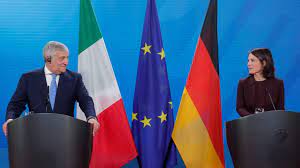Italy and Germany ready their Action Plan amid slow progress on migration

Rome: Italian Foreign Minister Antonio Tajani on Thursday flew to Berlin for a meeting with his local counterpart Annalena Baerbock.
The bilateral relationship, trade ties and EU-wide issues like migration were the main points of discussion, with the two promising during the ensuing presser that Italy and Germany would “work together for joint European solutions.”
In the background, even amid the political distance and the run-up to the European elections in June 2024, the work for the Italo-German “Action Plan” – intended to consolidate bilateral ties across five strategic sectors – is proceeding steadily.
The signing ceremony is slated to take place at the end of November at an intergovernmental summit in Germany, confirmed FM Baerbock.
The Action Plan. The document is designed to close the Franco-German-Italian triangle after the Quirinal Treaty reinforced ties between Rome and Paris. It covers five planned strategic areas of collaboration: growth, competitiveness and employment; foreign and security policy; green agenda and climate protection; Europe and the rule of law; culture and civil society.
It also includes the creation of a 2+2 format with the foreign and defence ministers of the two countries, a bilateral macroeconomic forum between finance ministers, and an institutional dialogue on migration between the interior ministries.
According to Jörg Buck, managing director of the German-Italian Chamber of Commerce, the Plan must “also provide for closer cooperation on industrial policies for the ecological transition,” as coordination on the two countries’ strategies and role in Europe “is crucial to successfully accomplishing the ecological and digital transition and to decisively continue on the path of European integration – the only real tool for overcoming the challenges before us.”
The thorniest issue. Migration has been front and centre over the past few days, as politicians in Berlin and Rome have clashed over the management of migrants, the financing of NGOs and European solidarity – especially towards countries of first entry such as Italy. Right before FM Tajani’s visit, the German government made a step forward by walking back on its opposition to the agreed-upon reform of the EU migration framework, removing one of the biggest obstacles to it becoming law.
“We will not leave individual European states alone. Our common goal is that people do not leave even in those rickety boats, said FM Baerbock, adding that the way forward is to “work with the countries of origin, also to facilitate the repatriations of those who have no right to stay.”
Expressing appreciation for her words, FM Tajani reiterated that Rome and Berlin believe in EU-wide action and stressed that the way forward is “encourag[ing] the growth of the African continent” as the only way to curb migration.
That’s the core concept of Italy’s upcoming Mattei Plan for Africa.
There’s still some way to go. France and Italy have grown more aligned on the issue of migration, meaning that with Germany’s help, the possibility of reaching a new deal is within reach. Still, Berlin’s change of pace came with a number of added demands and requirements, and it still disagrees with Rome on how to manage NGO operations.
Prime Minister Giorgia Meloni, whose hope is to achieve “structural solutions,” had given Chancellor Olaf Scholz an appointment to “discuss the issue in person” at the European Political Community Summit and European Council in Granada, Spain, on October 5 through 6.
Reasons for hope. Still, in a sign that it’s more focussed on cooperation than instrumentalising the political distance between the two governments, Berlin has decided to overlook incendiary comments by the League’s Andrea Crippa. “Eighty years ago, the German government decided to invade States with the army, but it went wrong. Now they finance the invasion of illegal immigrants to destabilise governments that the Social Democrats do not like,” said Matteo Salvini’s second-in-command on Tuesday.
On Thursday, FM Tajani (whose Forza Italia party is the League’s coalition ally) retorted that Mr Crippa is not a government member and, therefore, his statements do not reflect the government’s position.
Interlinked economies. ISTAT data shows that the Italo-German trade exchange in 2023 stands at €86.5 billion euros, a slight increase (+0.3%) compared to the same period in 2022. Italian exports to Germany were worth €39.4 billion in the first two quarters of 2023, decreasing only 1% compared to last year, while German exports to Italy rose slightly to €47.1 billion (+1.5%) in the same period.
As noted by the German-Italian Chamber of Commerce, the volume of goods traded between the two countries is very dependent on the sector. Exports from Italy marked growing volumes only in the machinery and electrical-electronics sectors while increasing imports from Germany were related to food and transportation equipment, along with machinery and electrical-electronics.





